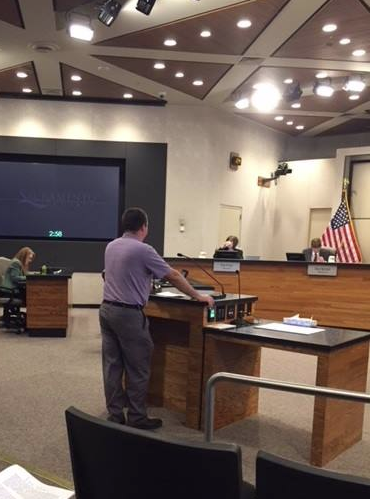Some Small Victories with Arden Creek Town Center project
On Tuesday January 23 the County Board of Supervisors, sitting as an appellate body, spent over 3 hours agonizing over the appeals filed concerning the staff-level approval of the Arden Creek Town Center project at the NE corner of Arden and Watt. To refresh memories, a lot of community members had serious concerns about some of the design aspects of the shopping center renovation there. None of those opposed to the proposal ever said the site should not be a commercial center, nor did they say they wanted the ugly center to stay like it is or to fail. Of course, the developer and friends falsely and forcefully vilified the opponents as haters of any and all commercial improvements.
The appointees who serve on the Arden Arcade Community Planning Advisory Council (CPAC) had approved the project with some conditions, which were ignored when County staff approved the project. Thus the CPAC appealed. The County doesn't charge the CPAC for an appeal. But in the haste to close the deal, some last-minute confusion among staff and the CPAC resulted in the lack of a legitimate traffic analysis and some other fine points being left out of the CPAC's appeal. Arden Park resident Julie Linderman was present at the County offices as the clock ticked down towards the appeal deadline and, knowing many people were concerned about the missing items, had the presence of mind to file a second appeal to fill in the blanks. That must have irritated the County because they socked Julie with a nearly $4,000 fee for that service to the community. The two appeals were consolidated and the matter was sent the matter on the the Board of Supervisors.
Julie applied for a waiver of the exorbitant filling fee and soon suffered slings and arrows from the developer and friends. But the community rallied to her side. A whole lot of people signed an online petition in support of her request. Several people wrote letters of support to the Board of Supervisors. Some even took time from their day to testify on her behalf at the Board's meeting on Tuesday. The community members pointed out how Sacramento County's fee for a citizen appeal is sky-high compared to other jurisdictions, serving primarily to quell citizens' exercise of their right to petition their elected officials. It was an uphill fight {Why? Good question, but observers of the County's disdain for constituents is not hard to figure out} that ultimately prevailed. Though the Board was adverse to waiving the $3925 fee, not only did they waive the fee but they held a prolonged discussion about the possibility of revising the County appeal fee structure and creating actual policies and procedures for appealing administrative decisions.
After that hard-won skirmish, community members presented their cases for improving the approved design. No CPAC representative showed up to plead the issues of the CPAC appeal. In typical fashion, County staff stood -in for the CPAC and misrepresented their concerns. But they were not able to totally beat back Julie's part of the appeal. The Board thus had to puzzle through the exceptions to the zoning code that were being appealed. They paid considerable attention to proposed large signs that were inconsistent with code, ultimately concluding that the signs should go back to the design review process for better aesthetics. They also grappled, unsuccessfully, with the issues related to the residential separation wall. The developer wanted a cheap, quick-and-dirty "Quick Quack" fence instead of a concrete masonry wall like the kind found at shopping centers in other jurisdictions or like the ones the County has built along Hazel that respect adjacent residential property. As expected, the Supervisors sided with the developer instead of the impacted neighbors. Overall, the BOS dismissed the appeals and upheld the staff approval, but to everyone's surprise they added a couple of stipulations of their own. The drive-thru food service cannot be open 24 hours, it must close from 12am-4am. Further, to help deal with crime, the project must have security cameras. All-in-all, the decision, though not a win, did result in some improvements and was worthwhile for forcing at least some listening behavior towards the concerns of "the people" participating in government.

